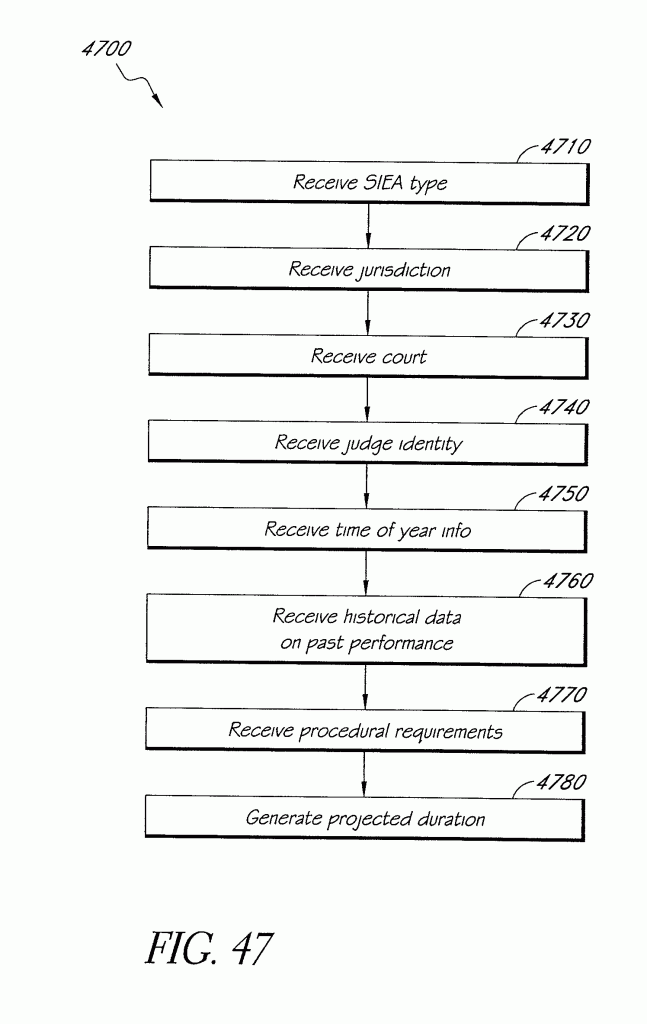
Inventors Robert J. Jackson, Paul Jackson, Scott Jackson
Original Assignee OneDemand.com, Inc.
.
Abstract
A legal process management system facilitates simultaneous dynamic dialogs between legal process managers and networked attorneys and contractors providing services in connection with security interest enforcement actions (SIEAs). The legal process managers submit queries and deadlines selected to timely guide the attorneys and contractors through the requirements of the SIEAs. The attorneys and contractors submit responsive answers revealing the status of their SIEAs. In some embodiments, an events based management system uses a stochastic model to calculate completion times for the milestones of the SIEA, including the “events” that make up subparts of the milestones. This provides a flexible and powerful system for managing prosecution of the SIEA and for predicting likely durations. The stochastic model incorporates the concept of both fixed-frequency events and random-frequency events, and also allows for both controlled events and managed events. A reporting system is also provided for keeping track of event and milestone completion.
[…]
Systems have been developed that create projections of the amount of time required to complete the prosecution of a security interest enforcement action. Such systems have been used by Fidelity: First American; McCalla Raymer, LLC; DRI Management Systems, Inc.; Indymac Bank; and Fair Isaac Corporation (dba LenStar). Each of these systems is based on a deterministic timeline management model that identifies static “milestones” and that allocates a predetermined unchangeable time to complete each milestone. These static milestones are an inaccurate reflection of the actual timelines followed in prosecuting security interest enforcement actions, and as such provide a poor structure by which to assess the performance of attorneys in prosecuting same.
[…]
SUMMARY OF THE INVENTION
The present invention provides various features that relate directly or indirectly to the prosecution of security interest enforcement actions. These features may be embodied alone or in combination.
One feature of the invention involves a method for assessing the performance of an attorney responsible for prosecuting a security interest enforcement action in a specified jurisdiction. In a preferred embodiment, the attorney performance is assessed by generating one or more milestones associated with the security interest enforcement action in the specified jurisdiction, determining a projected time needed to complete one or more of the stones by applying a stochastic model that accounts for the occurrence of one or more fixed-frequency events and/or random-frequency events associated with the milestones, receiving information on the attorney’s actual performance in prosecuting the security interest enforcement action; and assessing the timeliness of the attorney’s actual performance by comparing it to the projected time. In a preferred embodiment, the attorney’s actual performance is compared to the attorney’s timeliness in meeting a projected time for a milestone associated with completion of the security interest enforcement action. In another embodiment, the timeliness of the attorney’s actual performance is compared to the attorney’s timeliness in meeting a total projected time associated with meeting all milestones associated with completion of the security interest enforcement action.
In a preferred embodiment, one or more of the events include “controlled” events that have projected durations determined from procedural requirements for the security interest enforcement action in the specified jurisdiction, and the attorney’s actual performance is assessed by comparing the attorney’s timeliness in completing a controlled event to a projected duration associated with the controlled event. In a preferred embodiment, one or more of the events comprise “managed” events having projected durations determined from statistical analysis on historical data on the actual durations associated with the managed events, and the attorney’s actual performance is compared to the attorney’s timeliness in completing a managed event to a projected duration associated with the managed event.
In a preferred embodiment, the stochastic model is applied to the generated fixed-frequency and random-frequency events by summing the projected durations associated with the fixed-frequency and random-frequency events, and summing, for the random-frequency events, the projected duration associated with the random-frequency event multiplied by a weighting factor. Preferably, the weighting factor is a measure of the likelihood of occurrence of the random-frequency event.
Another feature of the invention involves a method for selecting an attorney to prosecute a security interest enforcement action from among a population of candidate attorneys. In a preferred embodiment, the method includes, for each candidate attorney from the population, rating the timeliness of the candidate attorney’s actual performance in prosecuting past security interest enforcement actions by comparing the candidate attorney’s actual times in completing milestones associated with past security interest enforcement actions to projected times needed to complete the milestones, where the projected times are determined by applying a stochastic model that accounts for the occurrence of fixed-frequency and random-frequency events associated with the milestones, and assigning responsibility to the candidate attorney having the highest timeliness rating. In one embodiment, the candidate attorneys are rated solely on their past performance in prosecuting a particular type of security enforcement action. The candidate attorneys may also be rated on their past performance in a particular jurisdiction, in a particular state, in a particularly county, in a particular court, or in front of a particular judge.
The features herein may be applied in the context of any security interest enforcement action, including an action to enforce a lien secured by real property, an action to take possession of real property, an action to take possession of personal property, a bankruptcy action, and a real estate foreclosure action.
[…]
FIG. 47 illustrates a method 4700 associated with one embodiment for determining the time required for completing an SIEA. The method 4700 includes a first step 4710, in which the type of SIEA being prosecuted is identified. For example, one type of SIEA is a post-foreclosure eviction action. In a second step 4720, the specific jurisdiction in which the SIEA is being prosecuted is identified. For example, the specific jurisdiction may be a state, such as California. In a third step 4730, the specific court in which the SIEA is being prosecuted is identified. For example, a specific court may be Santa Clara Superior Court, in San Jose, Calif. In a fourth step 4740, the specific judge in which the SIEA is being prosecuted is identified. For example, the judge may be identified as Judge Joseph J. Jones of Santa Clara Superior Court. In a fifth step 4750, the time of year in which the SIEA is being prosecuted is identified.



